King George (9 page)
Authors: Steve Sheinkin

W
ho should write the Declaration of Independence? That was the committee's first decision. Franklin was sick in bed, so he was out. John Adams thought Thomas Jefferson was the man for the job. Jefferson wasn't so sure. According to Adams, he and Jefferson had a discussion that went like this:
ho should write the Declaration of Independence? That was the committee's first decision. Franklin was sick in bed, so he was out. John Adams thought Thomas Jefferson was the man for the job. Jefferson wasn't so sure. According to Adams, he and Jefferson had a discussion that went like this:
Jefferson:
You should do it.
Adams:
Oh! No.
Jefferson:
Why will you not? You ought to do it.
Adams:
I will not.
Jefferson:
Why?
Adams:
Reasons enough.
Jefferson:
What can be your reasons?
You should do it.
Adams:
Oh! No.
Jefferson:
Why will you not? You ought to do it.
Adams:
I will not.
Jefferson:
Why?
Adams:
Reasons enough.
Jefferson:
What can be your reasons?
Adams:
Reason firstâyou are a Virginian, and a Virginian ought to appear at the head of this business. Reason secondâI am obnoxious, suspected, and unpopular. You are very much otherwise. Reason thirdâyou can write ten times better than I can.
Jefferson:
Well, if you are decided, I will do as well as I can.
Adams:
Very well. When you have drawn it up, we will have a meeting.
Reason firstâyou are a Virginian, and a Virginian ought to appear at the head of this business. Reason secondâI am obnoxious, suspected, and unpopular. You are very much otherwise. Reason thirdâyou can write ten times better than I can.
Jefferson:
Well, if you are decided, I will do as well as I can.
Adams:
Very well. When you have drawn it up, we will have a meeting.
John Adams
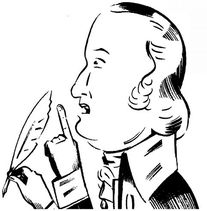
Writing at night in his room (after spending long days in Congress), Jefferson worked on the document for the next two weeks. When he had a draft he liked, he made a copy and sent it to Franklin, who was still stuck in bed. Franklin made a few quick suggestions. Then the document was given to Congress. “We were all in haste,” John Adams explained. “Congress was impatient.”
D
on't you hate it when you hand in a report and your teacher gives it back all marked up with corrections in red ink? Now you know how Jefferson felt on July 3, 1776. Jefferson sat in Congress, a look of pain on his face, as he watched the other members change his work. He was sure they were ruining some of the best parts.
on't you hate it when you hand in a report and your teacher gives it back all marked up with corrections in red ink? Now you know how Jefferson felt on July 3, 1776. Jefferson sat in Congress, a look of pain on his face, as he watched the other members change his work. He was sure they were ruining some of the best parts.
Ben Franklin (who was finally feeling better) sympathized with the sensitive Jefferson. He sat down next to Tom and tried to distract him by telling him funny stories.
As Adams said, Congress was in a hurry. So by the next day, the members were ready to vote on Jefferson's document. Congress approved the Declaration of Independence on July 4, 1776.
Today, we think of this as the most important day in our country's history. To Jefferson, July 4 was just another day. He made only two entries in his diary that day. First, he wrote that the temperature in Philadelphia rose from sixty-eight degrees to seventy-six degrees. Second, he noted that he had bought seven pairs of women's gloves to take back to Virginia.
L
et's get right to the point. The Declaration of Independence basically says three things, in this order:
et's get right to the point. The Declaration of Independence basically says three things, in this order:
1.
People are born with certain rights.
People are born with certain rights.
2.
King George has taken those rights from us.
King George has taken those rights from us.
3.
So we're forming our own country.
So we're forming our own country.
Of course, Jefferson's words are a little better. Okay, a lot better. This is how he introduced the idea of rights that belong to all people:
“We hold these truths to be selfevident, that all men are created equal, that they are endowed by their creator with certain un-alienable rights, that among these are life, liberty, and the pursuit of happiness.”
Not bad. Then Jefferson went on to say some nasty things about King George: “The history of the present King of Great Britain is a history of repeated injuries ⦠. all having in direct object the establishment of an absolute tyranny over these states.”
Thomas Jefferson

Jefferson listed all the ways King George had violated the colonists' rights. It was a very long listâwe don't have room for it here.
Then he came to the part everyone was waiting for: “We, therefore, the representatives of the United States of America ⦠declare that these united colonies are, and of right ought to be free and independent states.”
And that's how you declare independence in style.
T
he Declaration of Independence was read in the streets and printed in newspapers. Pretty soon the whole country (we can call it a country now) was talking about it. Abigail Adams wrote to John, saying she looked forward to “the future happiness and glory of our country.” She said she was very proud that her husband had been such a big part of founding a new nation.
he Declaration of Independence was read in the streets and printed in newspapers. Pretty soon the whole country (we can call it a country now) was talking about it. Abigail Adams wrote to John, saying she looked forward to “the future happiness and glory of our country.” She said she was very proud that her husband had been such a big part of founding a new nation.
John Adams was proud also. But he told Abigail that some of the other members of Congress were not too eager to sign their names to the Declaration of Independence. That's because anyone who signed it would be considered a traitor to Britain. And the punishment for traitors was well known: death by hanging.
This frightening fact was on everyone's mind when members gathered to sign the Declaration. John Hancock signed first, then had this exchange with Ben Franklin:
John Hancock:
There must be no pulling different ways. We must all hang together.
There must be no pulling different ways. We must all hang together.
Ben Franklin:
“Yes, we must indeed all hang together, or most assuredly we shall all hang separately.”
“Yes, we must indeed all hang together, or most assuredly we shall all hang separately.”
With this very real danger in mind, a tall, heavy member of Congress named Benjamin Harrison turned to a skinny member named Elbridge Gerry and said: “When the hanging scene comes to be exhibited, I shall have the advantage over you on account of my size. All will be over with me in a moment, but you will be kicking in the air half an hour after I am gone.” -
That was kind of a sick joke, but it captured the nervous mood in Congress. There was no turning back now.
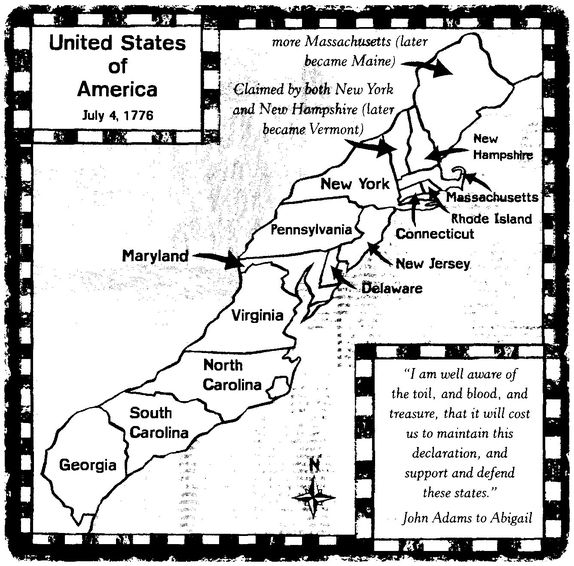
C
opies of the Declaration of Independence were sent across the ocean to Britain. As far as we know, King George pretended it didn't exist. But lots of other British people did read the Declaration. Some were not very impressed. Their major complaint was this: many members of Congress were slave owners. How could slave owners declare that “all men are created equal”? How could people who own slaves say that all men have the right to “life, liberty, and the pursuit of happiness”?
opies of the Declaration of Independence were sent across the ocean to Britain. As far as we know, King George pretended it didn't exist. But lots of other British people did read the Declaration. Some were not very impressed. Their major complaint was this: many members of Congress were slave owners. How could slave owners declare that “all men are created equal”? How could people who own slaves say that all men have the right to “life, liberty, and the pursuit of happiness”?
Or, as a famous English writer named Samuel Johnson put it: “How is it that the loudest yelps for liberty come from the drivers of slaves?”
You've got a good point, Johnson. If you visited the homes of George Washington, Thomas Jefferson, Patrick Henry, and many other Patriot leaders, you would have seen enslaved African Americans. Did these guys believe in freedom, or didn't they? Patrick Henry wrestled with this question in a letter to a friend, saying:
“Would anyone believe I am the master of slaves of my own purchase? I will not, I cannot justify it.”
Washington and Jefferson also wrote against slavery in their personal letters. But they simply did not see the American Revolution as a fight for the freedom of all Americans, black and white.
Patrick Henry
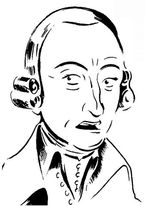
As you have figured out by now, the story of our country is not a fairy tale. No one is perfect and not everyone lives happily ever after. Hey, at least it's not boring.
B
y July 1776, George Washington and the Continental army had moved from Boston to New York City. On July 9, Washington had the Declaration of Independence read to his soldiers. They gave three loud cheers.
y July 1776, George Washington and the Continental army had moved from Boston to New York City. On July 9, Washington had the Declaration of Independence read to his soldiers. They gave three loud cheers.
Then some of the guys went to the park in town where a King George statue was standing. This was the statue that NewYorkers had put up after the king agreed to repeal the Stamp Act. Now American soldiers helped a group of New York Patriots tie ropes around the top of the statue and yank it down to the ground. They even had an idea of how to reuse the statue's four thousand pounds of metal. “The lead we hear is to be run up into musket balls for the use of the Yankees,” said a soldier named Isaac Bangs.
But General Washington knew he would need a lot more than a fancy declaration and bullets from a statue. The British army was about to begin a massive attack in New York. And Washington had no idea how he was going to stop it. He warned his men, “The eyes of all our countrymen are now upon us. The fate of unborn millions will now depend, under God, on the courage and conduct of this army ⦠we have therefore to resolve to conquer or die.”
No pressure, guys. Just save your countryâor die trying.
Sixteen-year-old Joseph Plumb Martin still hadn't made up his mind. Was today the day he would enlist in the Continental army? “I thought I was as warm a Patriot as the best of them,” Martin said. On the other hand, he wasn't exactly sure he was ready to risk getting shot. “I felt myself to be a real coward,”he admitted.
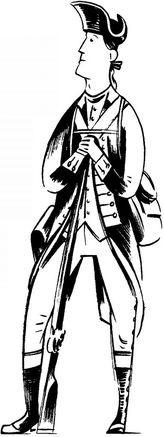
J
oseph Plumb Martin walked up to the table where a Continental army officer was seated. A bunch of Martin's friends were standing around the table, trying to get their courage up.
oseph Plumb Martin walked up to the table where a Continental army officer was seated. A bunch of Martin's friends were standing around the table, trying to get their courage up.
“Comeâif you will enlist, I will,” said one friend to another.
“You have long been talking about it.” was the reply. “Come, now is the time.”
Martin sat down at the table. The officer handed him enlistment papers and a pen. Martin dipped the pen in ink. He continued going back and forth in his mind ⦠and then he signed his name.
Martin left his home in Connecticut and sailed to New York City to join George Washington's army. He began exercising and training. And he began eating army food. The flour-and-water biscuits were especially bad. “They were hard enough to break the teeth of a rat,” Martin remembered.
Meanwhile, George Washington had troubles of his own. Washington had about 19,000 soldiers in New York. Most of them were like young Josephâwilling to fight, but totally inexperienced in battle. The British, on the other hand, had 32,000 well-trained troops. That included about 8,000 of those rented Germans, who were famously fierce fighters.
Washington knew he was in trouble. “We expect a very bloody summer at New York,” he wrote to his brother. The general strapped two pistols to his belt and warned his men to stay ready. “I will not ask any man to go further than I do,” he told them. “I will fight so long as I have a leg or an arm.”
The soldiers slept in their uniforms, guns by their sides.
T
he British attack came on August 22, a beautiful summer day in New York. Thousands of British and German soldiers poured off their boats and started marching toward the American forts on Long Island.
he British attack came on August 22, a beautiful summer day in New York. Thousands of British and German soldiers poured off their boats and started marching toward the American forts on Long Island.
On their way to battle, British soldiers passed rows of apple trees, the branches bending with ripe, red fruit. This was too tempting a sight for guys who had been stuck aboard ships for months, eating salty, rotting ship foodâso they stopped to pick and eat apples. Then they got right back to the attack.
Soon the soldiers approached the small village of Flatbush. And, as you might expect, the people of Flatbush began to panic. “Women and children were running hither and thither,” said a sixteen-year-old girl named Femmetia. “Men on horseback were riding about in all directions.” Femmetia looked down the street and saw the doors of the red schoolhouse fly open. “The boys rushed out with a shout,” she said. No more school today!
Then Femmetia helped her mother and sister load everything they could carry into a wagon:
“My sister and I were all excitement, rushing wildly about the house and bringing the most useless things ⦠. to put in the wagon. Mother coolly took out whatever did not seem to her necessary.
”
”
Femmetia
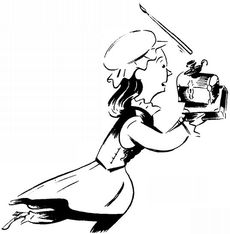
The family rode off to stay with relatives farther from the fighting. They came back to their village a few days later to inspect the damage. “Two of our neighbors' houses, as well as our own, were burned to the ground,” Femmetia said.
T
his battle was a disaster for the Continental army too. In a week of fighting on Long Island, more than a thousand Americans were killed, wounded, or captured. And Washington's army was driven back, and back, and back ⦠until it was right up against the edge of the one-mile-wide East River. Washington faced an ugly truth: his entire army was about to be captured right there, right then. Not exactly the way he was hoping the American Revolution would end. But could he slip out of the trap before it shut?
his battle was a disaster for the Continental army too. In a week of fighting on Long Island, more than a thousand Americans were killed, wounded, or captured. And Washington's army was driven back, and back, and back ⦠until it was right up against the edge of the one-mile-wide East River. Washington faced an ugly truth: his entire army was about to be captured right there, right then. Not exactly the way he was hoping the American Revolution would end. But could he slip out of the trap before it shut?
On August 29, Joseph Plumb Martin found out the army was moving when he saw the other soldiers of his company lining up and preparing to march. No one could tell him where they were going. First of all, they didn't know. Second of all, they weren't allowed to talk. “We were strictly enjoined [ordered] not to speak, or even cough,” Martin said. “All orders were given from officer to officer, and communicated to the men in whispers.”
As soon as it was dark, the men started crowding onto small boats. A group of Massachusetts fishermen under the command of John Glover rowed the boats back and forth across the river. (Glover's regiment, by the way, was one of the first to include black and white soldiers working side by side.)
To make the British believe that nothing special was happening, some American troops had to stay behind until the last second. They kept lots of campfires burning, which made it look like a normal night
in the American camp. An officer named Benjamin Tallmadge remembered waiting all night for orders to march down to the river. “It was one of the most anxious, busy nights that I ever recollect,” he said, “and being the third in which hardly any of us closed our eyes to sleep.”
in the American camp. An officer named Benjamin Tallmadge remembered waiting all night for orders to march down to the river. “It was one of the most anxious, busy nights that I ever recollect,” he said, “and being the third in which hardly any of us closed our eyes to sleep.”
Glover and his men were still rowing back and forth across the river when the sun came up. Amazingly, fog saved them. A thick, wet fog settled over the river, and the entire army (including horses) escaped to Manhattan before the British knew what was going on. “In the history of warfare I do not recollect a more fortunate retreat,” said Tallmadge.
Too bad you can't win wars by retreating.
T
he American army had escaped to Manhattan, but George Washington hardly felt safe. He knew the British would continue their attack very soon. But where? When? With how many men? Washington was desperate for any information about British plans. He needed a spy. Nathan Hale volunteered.
he American army had escaped to Manhattan, but George Washington hardly felt safe. He knew the British would continue their attack very soon. But where? When? With how many men? Washington was desperate for any information about British plans. He needed a spy. Nathan Hale volunteered.
Nathan Hale was a twenty-two-year-old teacher who had no idea how to be a spy. One of Hale's friends from college, William Hull, tried to talk Hale out of accepting this dangerous mission. But Hale couldn't be budged. He said he had been in the army for a whole year and hadn't done anything yet. “I wish to be useful,” he told his friend.
So Hale put on a plain brown suit, stuck his college diploma in his pocket, and entered British-controlled territory pretending to be a teacher in search of a job.
No one knows exactly what Hale did or where he went for the next nine days. But on the night of September 21, some British soldiers became suspicious of Hale. They grabbed him and searched him and found more than just a college diploma. They found a map he had drawn and notes on the strength and location of the British army (a more experienced spy would have at least used invisible ink or secret codes).
Nathan Hale

Hale didn't even try denying that he was a spy. And the British didn't even bother giving him a trial. They hanged him the next morning.
When they put the rope around his neck, did Nathan Hale really say the famous line?
“I only regret that I have but one life to lose for my country.”
Yes he did, according to Hale's friend William Hull. Hull wasn't at the hanging, of course, but he got the story from a British officer who watched the execution.
And that's pretty much all we know about Nathan Hale.
M
eanwhile, the Continental army was busy moving backward again.
eanwhile, the Continental army was busy moving backward again.
As one of the soldiers in charge of guarding the shore of Manhattan, Joseph Plumb Martin kept a watch on the water. Every few
minutes he and the other American guards called to each other, “All is well!”
minutes he and the other American guards called to each other, “All is well!”
But the enemy ships were so close, British soldiers could hear the Americans talking. And when they heard the Americans say, “All is well!” they called back, “We will alter your tune before tomorrow night!” They kept their promise.
The British attacked again on September 15. And again the untrained Americans were forced to retreat. In the panic and confusion, Martin got separated from his unit. He was soon sprinting across the island of Manhattan, with the British army close behind. He dove into a swamp and hid behind bushes and weeds while the British marched past. “Several of the British came so near to me that I could see the buttons on their clothes. They, however, soon withdrew and left the coast clear for me again.”
Washington stood on the battlefield watching his soldiers run for their lives. He screamed for the men to stop. He even hit a few of them as they passed, but the soldiers were simply too scared to stop running.
An American officer named George Weedon witnessed Washington's fury on this day. “The General,” Weedon said, “three times dashed his hat on the ground, and at last exclaimed, âGood God, have I got such troops as those!'”
Other witnesses heard Washington shouting: “Are these the men with whom I am to defend America?”
Washington was so angry, his officers had to pull him off the battlefield to keep him from getting captured.
T
he Continental army continued fighting and retreating through October and November. The British chased them out of New York City, across the Hudson River, and south into New Jersey. “As we go forward into the country the Rebels fly before us,” said British captain William Bamford. “'Tis almost impossible to catch them.”
he Continental army continued fighting and retreating through October and November. The British chased them out of New York City, across the Hudson River, and south into New Jersey. “As we go forward into the country the Rebels fly before us,” said British captain William Bamford. “'Tis almost impossible to catch them.”
Things were looking terrible for Washington's armyâwhat was left of it, that is. Soldiers were deserting every day. “Great numbers of them have gone off; in some instances almost by whole regiments,” Washington reported to Congress.
To make things worse, men were taking Continental army guns and ammunition home with them. One guy even tried to take home a cannonball! When it was found in his bag, he had an excuse ready. He wanted to give it to his mother, he said. She could use it to pound spices.
By the end of November, Washington had just three thousand men left. This little army crossed the Delaware River and set up camp in Pennsylvania. Washington sent Congress an update, saying, “The situation of our affairs is critical and truly alarming.” Congress agreed. With the British moving closer and closer to Philadelphia, the members of Congress decided to pack up and run away to Baltimore.
What else could go wrong? Plenty. Cold weather was coming and the soldiers had no winter clothing. And there was never enough to eat. Joseph Plumb Martin remembered the men in his unit going without food for two full days. When they complained of hunger pains, an angry officer reached into his pocket and pulled out a piece of dried corn that was burnt to a black crisp and said, “Here, eat this and learn to be a soldier.”
Now for the worst part: Washington's small army was about to get even smaller. Most of the soldiers had enlisted in the army only until the end of the year. Then they expected to go home for the winter. Martin's enlistment ended in December, and he eagerly traveled home to his family and friends. “They appeared to be glad to see me,” he said, “and I am sure I was really glad to see them.”
Don't worry, Martin will be back in the army the next year. But Washington couldn't wait until the next year. “Ten days more will put an end to the existence of our army,” he wrote on December 20.
Washington had ten days to save the Revolution.
Other books
Fated Love by Radclyffe
Infernal Bonds by Holly Evans
Bewitched by Hebert, Cambria
Wars of the Ancient Greeks by Victor Davis Hanson
Memoirs of a Timelord by Ralph Rotten
Good Home Cookin': A Novel of Horror by Christian Burch
Prince of Wolves by Loftis, Quinn
History by Elsa Morante, Lily Tuck, William Weaver
The Secret Place by Tana French
Male Sex Work and Society by Unknown